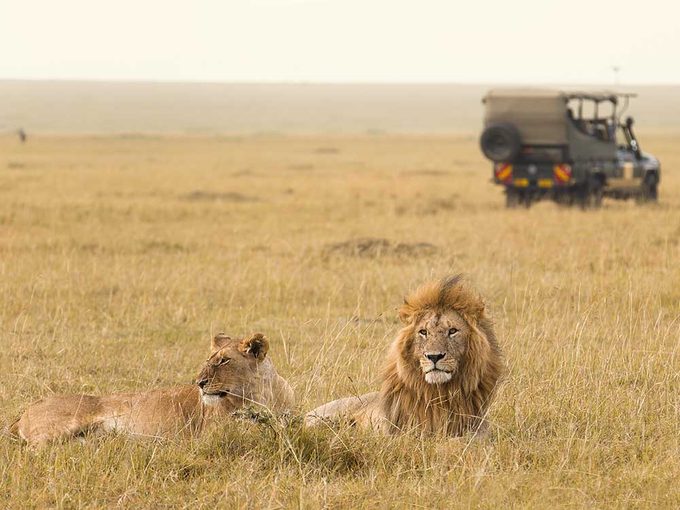Adventure Travel: What’s Hot, What’s Not
A week on a Caribbean beach or a jaunt through the tourist capitals of Europe still has its appeal. But how about embarking on an African safari, learning about Mayan civilizations or taking an off-road vehicle, well, off the beaten path. Adventure travel is hot, hot, hot. But some forms of ‘adventure’ are not, not, not.

Adventure travel, increasingly popular among baby boomers, covers a wide range of activities from camping to mountain biking, wildlife viewings to archaeological expeditions. But it’s as much a mindset, opening yourself up to new experiences and destinations, says Mariel Clayton, an adventure travel specialist with the Flight Centre in Oakville, Ontario.
“For me, ‘adventure’ means anything that challenges you, that you’ve never done before,” says Clayton. “It’s not about hiking Kilimanjaro, but about the intensity of the experience-doing something you’ll remember for the rest of your life.” Already in 2008, Clayton has seen a 30-40% increase in inquiries about adventure travel.
What explains the appeal? Chris Doyle, Director of the Seattle-based Adventure Travel Trade Association attributes it partly to a desire for more “culturally authentic” experiences, and trips that satisfy a growing interest in health, wellness and ecology.
Jeffrey Bernstein, who owns Quest Travel in Vancouver, says tourists are often looking for what he calls “soft adventures,” That means getting more in touch with nature, meeting the locals and enjoying everything that a destination has to offer, as opposed to just taking the standard package deal offered by travel companies or resorts.
What’s Hot
There are some adventure travel hot spots out there, with good reason:
Ecotourism: This type of travel-which appeals to the ecologically-conscious-has risen in popularity. Here, travellers look for locations, such as Costa Rica, where flora, fauna and natural highlights are the prime attractions. There, the Monteverde Cloud Forest Preserve features over 100 species of mammals, 400 species of birds and 2,500 species of plants. Clayton says Costa Rica is sufficiently “Westernized” and close to the rest of the Caribbean that people don’t feel as “out of their depth” as they would traveling farther from home.
Hiking Adventures: With people practicing more active lifestyles and desiring more “visceral” experiences, it’s no surprise that hiking excursions have grown, says Clayton. She points to Peru’s Inca Trail, with its mix of ruins, mountain scenery, lush forests, and subtropical jungle-all leading to Machu Picchu, known as “the lost city of the Incas”. “It’s a very hands-on trek,” says Clayton, like visiting a “living museum.”
Authentic Travel: Travellers who are looking to nurture their mind, body and spirit find that Thailand offers the best of all worlds. Tour operators cite the country’s natural beauty, enticing culture (“a spiritual and historical adventure”, says Clayton) and affordability. In areas like Phuket and Koh Samui, the beaches are gorgeous, plentiful and unspoiled-more like “Paradise Lost”, says Clayton, than the typical “packaged” beach vacation. Here, out-of-the-way beach bungalows (for $25 a night) are shacks with no amenities that appeal to those looking for a more authentic experience. With easy access to surrounding countries like Vietnam, Cambodia and Singapore, Thailand is also a great starting point to explore Asia.
Voluntourism: This category that’s rising in popularity. Volunteer travel, at it’s otherwise known, incorporates a community volunteer project with travel to a foreign country, notes Kira Zack of G.A.P Adventures in Toronto. Last year, G.A.P. doubled its number of such “voluntourism” trips, examples of which include assembling wheelchairs for landmine victims in Cambodia or volunteering in a rural village in South Africa to hep develop a pre-school.
What’s Not
As for not-so-hot adventure travel, Clayton points to two destinations in particular that are passé:
Adventure Light: With cultural excursions within distance of your all-inclusive resort, Mexico is for the not-so-adventurous, according to Clayton. Now, Mexico is more for those who just want to lounge on the beach. Anyone who wants a truer adventure is probably picking another destination, she says. “The generation that was raised on constant stimulation needs to be engaged, and doing nothing for hours at a time is not actually relaxing anymore.”
Cool Cruising: Alaska used to be people’s idea of adventure travel, but now “people want to get more hands on instead of watching from the bow of a ship or from a Jeep in Denali National Park and Preserve. It still attracts the older crowd, but I’ve seen a drop in interest. It’s not as ‘wild and rugged’ as it used to be, because it’s so much more accessible now.”
With adventure travel, the possibilities are endless; what really matters to a growing number of adventure travellers, says Zack, is simply “getting out of your comfort zone”.



